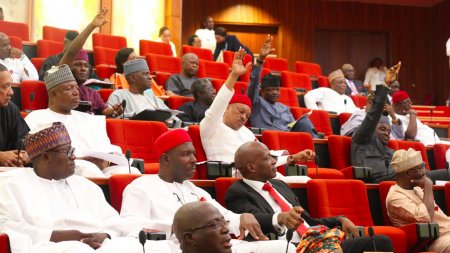P
ProfRem
Guest
Nigerian Senate on Wednesday whittle the powers of the President of the Federal Republic of Nigeria, if he decides to withhold assent in the process of altering the Constitution of the country.
The Upper Chamber took this decision while undertaking clause-by-clause voting on the 33-item recommendations based on 33 bills processed by its Committee on the Review of the 1999 Constitution, which was before the Chamber for approval.
The lawmakers resolved to whittle the powers of the President in Constitution amendment by voting in favour of a bill seeking to, among other things, provide the procedure for passing a Constitution Alteration Bill where the President withholds assent.

Consequently, the bill seeks to alter sections 58, 59 and 100 of the 1999 Constitution and make it easy for the lawmakers to override the president in order to resolve the impasse where the President or Governor refuses to signify his/her assent to a bill from the National Assembly or withhold such assent.
The Senate said that this decision became imperative to enable timely passage of laws for good governance, so that the people and the entire system would not suffer for possible irresponsibility of people in government.
The Upper Chamber took this decision while undertaking clause-by-clause voting on the 33-item recommendations based on 33 bills processed by its Committee on the Review of the 1999 Constitution, which was before the Chamber for approval.
The lawmakers resolved to whittle the powers of the President in Constitution amendment by voting in favour of a bill seeking to, among other things, provide the procedure for passing a Constitution Alteration Bill where the President withholds assent.

Consequently, the bill seeks to alter sections 58, 59 and 100 of the 1999 Constitution and make it easy for the lawmakers to override the president in order to resolve the impasse where the President or Governor refuses to signify his/her assent to a bill from the National Assembly or withhold such assent.
The Senate said that this decision became imperative to enable timely passage of laws for good governance, so that the people and the entire system would not suffer for possible irresponsibility of people in government.

